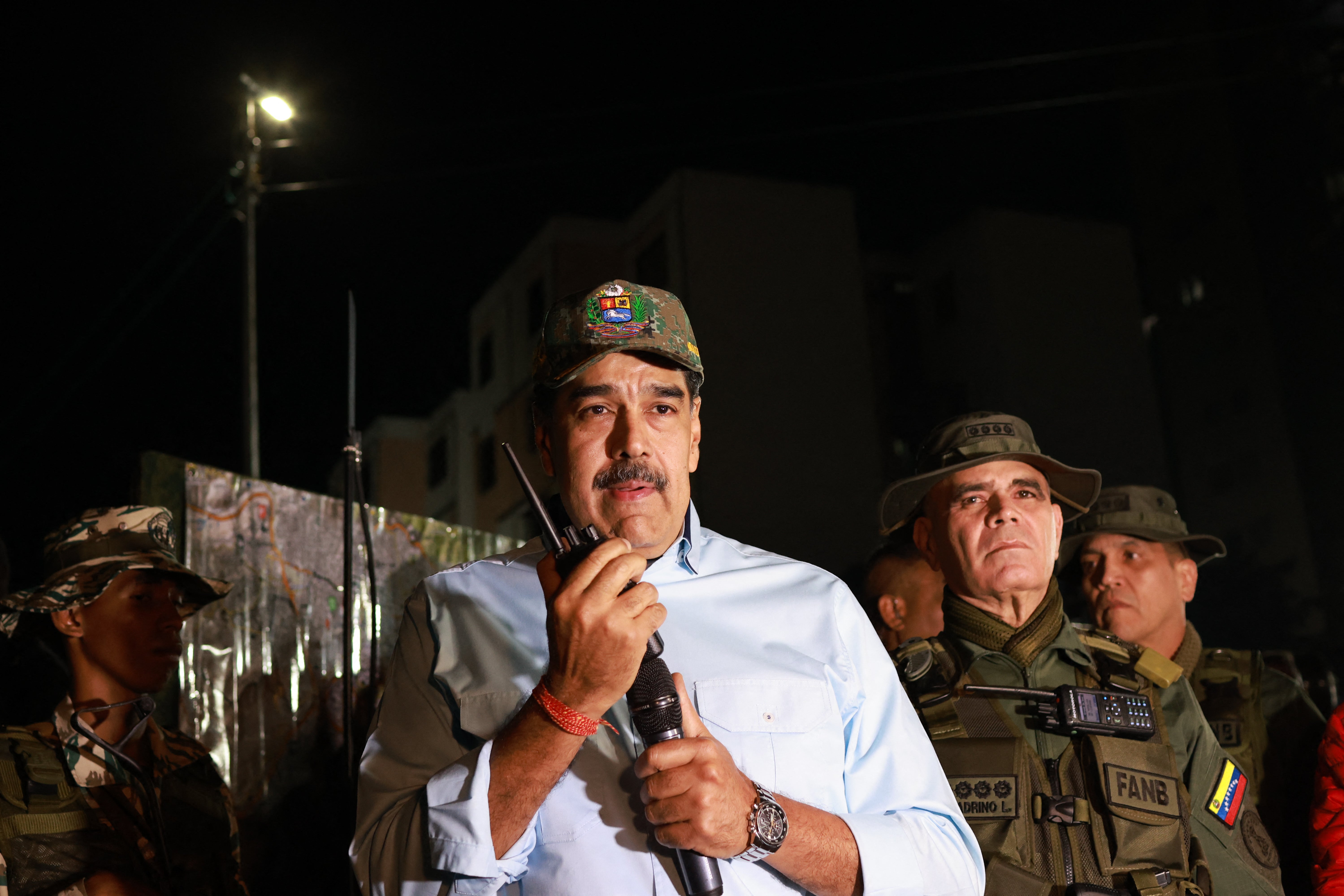Venezuelan President Nicolas Maduro said he would deploy military and militias to 284 “battlefront” locations across his country as tensions with the U.S. rise following a deadly strike last week.
Flanked by his defense minister, Maduro raised the stakes in a state television broadcast Thursday morning.
“We're ready for an armed fight, if it's necessary,” Maduro said from Ciudad Caribia, on the country's central coast, Reuters reported.
“Along all the Venezuelan coasts, from the border with Colombia to the east of the country, from north to south and east to west, we have a full preparation of official troops,” he said.
The escalation follows a lethal U.S. strike last week on what President Donald Trump claimed was a boat smuggling drugs out of Venezuela for the Tren de Aragua gang.

Trump alleged that the shipment in the Caribbean Sea was led by the Venezuelan president, which Maduro denied.
The strike on the vessel killed 11 people, which is the first known U.S. military attack against alleged drug traffickers since the Trump administration began sending warships to the Caribbean last month.
“Please let this serve as notice to anyone even thinking about bringing drugs into the United States of America. BEWARE,” Trump wrote last week, but the administration has since shared little information about the strike.
Venezuela’s interior minister said Thursday that none of the 11 people killed aboard the vessel belonged to Tren de Aragua.
“They openly confessed to killing 11 people," Diosdado Cabello said on state television. “We have done our investigations here in our country and there are the families of the disappeared people who want their relatives, and when we asked in the towns, none were from Tren de Aragua, none were drug traffickers.”
“A murder has been committed against a group of citizens using lethal force,” Cabello added.
The minister questioned how the U.S. could determine whether drugs were on board the vessel and asked why the individuals were not arrested instead.
The Independent has contacted the Pentagon for comment.
Vice President JD Vance was among those fiercely defending the strike and said that he “doesn’t give a s***” if people consider the action a “war crime.”
“Killing cartel members who poison our fellow citizens is the highest and best use of our military,” Vance said in a post on X at the weekend.
It is unclear how the U.S. military presence in the region will disrupt the drug trade. The ships are part of an “enhanced counter narcotics operation” to carry out drug interdiction missions in Latin America, a defense official told The Washington Post last week.

Phil Gunson, a Caracas-based political analyst for the International Crisis Group, believes the operation is “likely to be an expensive failure... since at best it will only temporarily disrupt trafficking in the eastern Caribbean”.
But he added: “There are ancillary goals, including the destabilization of the Maduro government and possibly even its collapse. That's something U.S. Secretary of State [Marco] Rubio has long promoted, but there appears to be no clear plan as to how to achieve it, and even less of an idea how to deal with the chaos that might ensue.”
Trump has long blamed Venezuela for a drug epidemic in the U.S., claiming Caracas is pouring narcotics in through illegal channels. Venezuela has denied the allegations, asserting that the vast majority of cocaine produced in Colombia departs through the Pacific.
Maduro is widely considered a dictator and not recognized by the U.S. as Venezuela's legitimate leader. He was sworn in to a third six-year term in January, and he maintains he was the legitimate winner of the presidential election last year.
The opposition, however, said there is credible evidence that its candidate had won the vote, as it urged the U.S. and other countries to ramp up pressure on Maduro to force him out of office.
The Trump administration announced a $50 million reward last month for Maduro’s arrest, accusing him of being one of the world's largest drug traffickers and working with cartels to flood the U.S. with fentanyl-laced cocaine. Maduro denies any connection to the drug trade.
Hegseth and Caine visit Puerto Rico as US steps up military operations in the Caribbean
Hegseth claims he has ‘absolute and complete authority’ to kill suspected drug gang members
Ukraine-Russia war live: Moscow drones in Poland could be ‘mistake’, Trump suggests
Trump marking 9/11 by attending a New York Yankees game
FBI releases image of ‘person of interest’ in Charlie Kirk killing: Live updates







